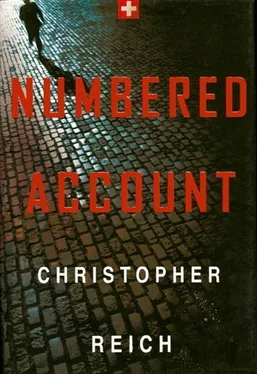“A tragedy,” opined Mevlevi, his eyes smiling at Nick.
Fuchs brushed the insignificant matter of his colleague’s passing aside. He smiled broadly to dispel any lugubrious thoughts. “We hope our firm can still be of service, Mr…”
“Malvinas. Allen Malvinas.”
Nick gave his complete attention to Ali Mevlevi, or rather to Allen Malvinas.
Mevlevi said, “I am in need of several numbered accounts.”
Fuchs cleared his throat before replying. “Surely, you realize that you can open such an account at any one of the banks just down the street from us.”
“Of course,” Mevlevi responded politely. “But I was hoping to avoid some of the more unnecessary formalities.”
Affentranger understood perfectly. “The government has grown much too intrusive as of late.”
Fuchs concurred. “And even our most traditional banks, not as discreet as they once were.”
Mevlevi opened his hands as if to say such is the world we live in. “I see we are in agreement.”
“Unfortunately,” Fuchs complained, “we must abide by government regulations. All clients wishing to open a new account of any type in this country must provide legitimate proof of their identity. A passport will do.”
Nick found the emphasis Fuchs had placed on the word new strange.
Mevlevi, though, jumped on the word as if it were the cue he had been looking for. “New accounts, you said. Of course, I understand the need to follow regulations should one wish to open a new account. However, I would prefer an older account, perhaps one registered in the name of your company that you don’t use on a day-to-day basis.”
Fuchs looked to Affentranger. Both men then looked at Nick, who kept a concerned expression on his face. Whatever it was they were seeking from him, he supplied it, for the next moment, Affentranger began talking.
“Such accounts do exist,” he said cautiously, “but they are very expensive to obtain. A dwindling resource, so to speak. Banks insist on certain minimum conditions being met before we are allowed to transfer a numbered account originally opened by our office to a client.”
“Naturally,” said Mevlevi.
Nick felt like telling Fuchs and Affentranger to name their price and get on with it.
“Do you wish to open just the one account?” asked Fuchs.
“Five to be exact. Of course, I have proper identification.” Mevlevi removed an Argentinean passport from his jacket and laid it on the table. “But I prefer to have the account remain anonymous.”
Nick eyed the navy passport and choked down a smile. Mr. Malvinas of Argentina, Malvinas being the Argentinean name for the Falkland Islands. Mevlevi thought himself a pretty clever customer. Sure, he was clever—his men at USB had informed him that the DEA had compromised account 549.617 RR—but he must be desperate too. Why would he leave his safe haven in Beirut and risk arrest to straighten out a banking problem that could just as easily have been remedied by someone here? Kaiser, Maeder, even Nick alone, could have made this trip to Zug. It was hardly adequate reason to flee the security of his prickly nest.
Fuchs asked, “Would accounts at the United Swiss Bank be of interest?”
“No finer institution in the land,” replied Mevlevi, to which Nick just nodded.
Fuchs picked up the phone and instructed his secretary to bring in several account transfer forms.
Affentranger said, “The minimum amount the United Swiss Bank has set for granting a client a preexisting numbered account is five million dollars. Of course as you need five accounts, we can discuss terms.”
“I propose placing four million dollars into each account,” said Mevlevi.
Nick could see Affentranger and Fuchs calculating their commission, somewhere between one and two percent. On this one transaction the august International Fiduciary Trust would garner fees of more than two hundred thousand dollars.
Fuchs and Affentranger answered in unison. “That would be fine.”
* * *
Conversation ebbed as Mr. Malvinas drank his coffee and the necessary paperwork was filled out. Nick excused himself and walked down the corridor to the rest room. He was joined immediately by Affentranger.
“A big fucking fish, that one, eh?”
Nick smiled. “It appears so.”
“You’re new at the bank?”
Nick nodded.
“Usually Kaiser sends Maeder. Don’t care for him much. He bites too hard.” Affentranger slapped his own fat ass. “Right here. Get my drift.”
Nick murmured his understanding. “Oh.”
“And you? You’re okay?” Affentranger asked. Which meant did Nick expect a commission on the business?
“I’m fine.”
Affentranger looked puzzled. “Fine, then. And remember, if you’ve got any more like him, send ’em our way.”
* * *
Inside the conference room, Fuchs rifled through the paperwork. Mevlevi sat at his side and together they filled in the pertinent information, or didn’t fill it in, as was the case. No name was placed on the accounts. Nor an address. All mail for the accounts was to be held at the United Swiss Bank, Main Office, Zurich. All that was required from Mr. Malvinas was two sets of code words. These he gave happily. The primary code word would be Ciragan Palace. The secondary, his birthday, November 12, 1936, to be given orally as day, month, and then year. A signature was required for verification of any written requests he might have, and this Mr. Malvinas kindly supplied. A seismic scrawl was duly inscribed at the bottom of the form. And then the meeting was finished, adjourned with smiles and handshakes all around.
Nick and his client remained quiet as they took the elevator to the ground floor. A Cheshire grin peeked from the corners of Mevlevi’s mouth. And why not? thought Nick. The man held five account transferral receipts in his hand; he possessed five clean numbered accounts to use as he saw fit. The Pasha was back in business.
In the limousine en route to Zurich, Mevlevi finally spoke. “Mr. Neumann, I will need to use the bank’s facilities. I have a small amount of cash that needs to be counted.”
“Of course,” Nick answered. Now the other shoe drops. “How much, approximately?”
“Twenty million dollars,” Mevlevi said coolly, staring at the bleak landscape. “Why do you think those suitcases were so damned heavy?”
At 11:30 the same morning, Sterling Thorne took up position fifty yards from the employee entrance to the United Swiss Bank. He stood inside the pillared entryway of an abandoned church, a drooping concrete assemblage of right angles, more sump house than place of worship. He was waiting for Nick Neumann.
His ideas about Neumann had changed drastically during the last twenty-four hours. The more he thought about it, the more he was sure Neumann was on his side. Out there by the lake, he swore he’d seen a spark of willingness in the kid’s eye. Neumann was this close to jumping on board the Fuck Mevlevi express. He’d tell him about Becker if and when he did. Not that there was much to tell.
Thorne had approached Martin Becker in mid-December for no other reason than that he worked in the section that handled Mevlevi—intercepts from the Defense Intelligence Agency noted the bank’s internal departmental reference, FKB4—and that he looked like a weak-willed paper pusher who might actually have a conscience. He was a smiler, and smilers usually liked a cause. Becker didn’t need much prodding to cooperate. He said he’d been thinking about it for a long time and that he’d do his best to bring out papers that would give irrefutable evidence of Mevlevi laundering his money through the United Swiss Bank. A week later he was dead: throat slit ear to ear and no trace of any papers that might help the DEA. Thorne would tell Neumann about him at the right time. No point in scaring the boy off.
Читать дальше












